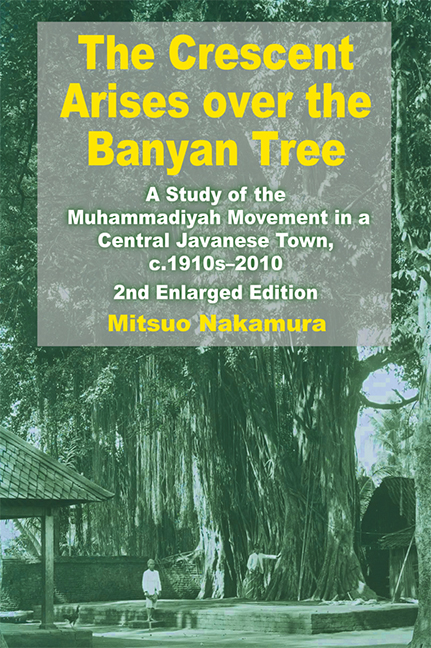 The Crescent Arises over the Banyan Tree
The Crescent Arises over the Banyan Tree Book contents
- Frontmatter
- Dedication
- Epigraph
- Contents
- List of Figures and Maps
- List of Tables
- List of Boxes
- Foreword to the Second Edition
- Preface to the Second Edition
- Foreword to the First Edition
- Preface to the First Edition
- Notes
- Map
- PART I DEVELOPMENT OF THE MUHAMMADIYAH IN KOTAGEDE, c.1910s–1972
- PART II KOTAGEDE REVISITED, 1972–2010
- Epigraph
- Map
- Introduction to Part II
- 8 Social Changes in Kotagede, 1972–2010
- 9 The Achievements of the Muhammadiyah
- 10 Internal Dynamics of the Muhammadiyah Movement
- 11 Challenges Facing the Muhammadiyah
- 12 Festival Kotagede: Conflict and Integration
- 13 The May 2006 Earthquake and Reconstruction of Kotagede
- 14 Concluding Remarks: Future of the Muhammadiyah
- Postscript to Part II
- Bibliography
- Glossary
- Appendices
- Index
- About the Author
9 - The Achievements of the Muhammadiyah
from PART II - KOTAGEDE REVISITED, 1972–2010
Published online by Cambridge University Press: 21 October 2015
- Frontmatter
- Dedication
- Epigraph
- Contents
- List of Figures and Maps
- List of Tables
- List of Boxes
- Foreword to the Second Edition
- Preface to the Second Edition
- Foreword to the First Edition
- Preface to the First Edition
- Notes
- Map
- PART I DEVELOPMENT OF THE MUHAMMADIYAH IN KOTAGEDE, c.1910s–1972
- PART II KOTAGEDE REVISITED, 1972–2010
- Epigraph
- Map
- Introduction to Part II
- 8 Social Changes in Kotagede, 1972–2010
- 9 The Achievements of the Muhammadiyah
- 10 Internal Dynamics of the Muhammadiyah Movement
- 11 Challenges Facing the Muhammadiyah
- 12 Festival Kotagede: Conflict and Integration
- 13 The May 2006 Earthquake and Reconstruction of Kotagede
- 14 Concluding Remarks: Future of the Muhammadiyah
- Postscript to Part II
- Bibliography
- Glossary
- Appendices
- Index
- About the Author
Summary
BACKGROUND: A BLACK HOLE IN HISTORY
Before reviewing the achievements of the Muhammadiyah in Kotagede, it seems necessary to make a sober reminder for ourselves about one of the starting points of the period which we are looking at. I have already mentioned the point in the section on political diversification in Chapter 8. I am referring to “a black hole” in the history of Kotagede (see Box 9, pp. 239–41) as the background for the subsequent growth of the Muhammadiyah. Communists were undoubtedly the ideological and social force that was the most antagonistic to the Muhammadiyah movement in the town of Kotagede since the pre-war time. They were, however, incapacitated almost overnight in late 1965 by the arrest of a large number of PKI members and its front organizations, and the permanent outlawing of their activities thereafter.
The Muhammadiyah developed its strength since then in a very favourable condition in which there was a void created by the disappearance of the PKI from the public scene. The national government took a policy of staunch anti- Communism. For that, the government launched its propaganda via the P2A (Proyek Pembinaan Agama or Religious Guidance Project) at the local level. The project involved local religious leaders, mostly from the Muhammadiyah in the case of Kotagede, as speakers at a series of pengajian (religious lectures) held in a thirty-five-day cycle. Those pengajian were aimed at gathering the “G30S/Ex-PKI people” for regular roll calls and debriefing of their ideology. As stated by one of its leaders, the immediate task of the Muhammadiyah movement after 1965 was to “‘regain’ the ex-PKI people to its fold”.
It was difficult to gather information on how effective these “brainwashing sessions” were since any topic related to the PKI was to be avoided during my first field stay. But, I became aware that many of the familiar faces at the ex-PKI pengajian, which I was allowed to join in, were also active in such communal Islamic rituals as the collection and distribution of zakat fitrah during Idul Fitri and the slaughtering of sacrificial animals and distribution of their meats during Idul Adha.
- Type
- Chapter
- Information
- The Crescent Arises over the Banyan TreeA Study of the Muhammadiyah Movement in a Central Javanese Town, c.1910s-2010 (Second Enlarged Edition), pp. 253 - 282Publisher: ISEAS–Yusof Ishak InstitutePrint publication year: 2012
